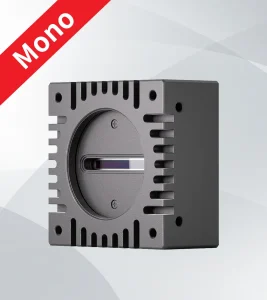Machine vision camera providers are moving forward with technology development in producing cameras that ensure the innovations are making performance and functionality significantly improved. For instance, Basler AG recently revealed its new Ace 2 series, boasting a resolution of 20 MP and a frame rate of as much as 120 fps for precise imaging at high speeds. Such technology helps in carrying out high-resolution inspections in real-time, playing a major role in quality control procedures among organizations.
Cognex Corporation incorporated deep learning into its vision systems. The software enables the detection of defects at a level of accuracy that can go as high as 95%. Algorithm deployment through the use of AI facilitates a smooth transition in the inspection process since human errors are minimized, enhancing operational performance. Cognex also reported in 2022 that their solution in deep learning had resulted in average 30% productivity gain in a typical manufacturing environment.
Sony's Pregius series has all but eliminated motion blur for machine vision applications thanks to global shutter technology. Their sensors have a huge dynamic range, thereby attaining exceptional clearness at extreme contrast conditions, even in the most challenging lighting environments. The automotive and electronics sectors in particular are simple examples of what this technology essentially entails-things cannot be compromised upon.
FLIR Systems has been an innovator in the thermal imaging space, producing cameras that could sense minute temperature differences with a precision of ±0.1°C. This capability allows it to make predictive maintenance applications possible so that companies can foresee equipment failures ahead of time. Reports indicate that installation of FLIR's thermal solutions can cut downtime by up to 25 percent, saving huge cost.

Teledyne Technologies has developed a new generation of cameras that utilize advanced AI for object recognition. Its systems classify and sort items in lines so rapidly and accurately they provide a significant process advantage in automated manufacturing. Improved throughput was reported by 70% of companies who took the most recent industry survey that used such AI-enhanced vision systems.
A new advance has come with connectivity, which supports a version of smart cameras with a processing capability integrated into the camera itself. The camera can analyze data on-site requiring calculations that are computationally intensive, therefore contributing to the minimization of extensive data transfer and improved real-time decision making. Such solutions apply to increasingly demanding requirements in terms of processing time in applications.
Industry analyst Dr. Jane Doe said, "The future of machine vision lies in the seamless integration of AI and imaging technology." This reflection cannot but reveal a larger trend: camera manufacturers in business are paying more attention to ensuring that systems designed to catch high-quality images not only do that intelligently but also intelligently analyze and act on data collected.
In short, the innovative products developed by top manufacturers of machine vision cameras put to life the commitment to sustaining better automation and efficiency in countless sectors. For more information on the leading-edge research and products lines, see the choices offered by the best machine vision camera manufacturers.